
How accurate is the historical portrayal here? I cannot say for sure. But I do think that the initial plot of having a simple man pretend to be king is nothing out of the ordinary but one that's deeply fascinating to see especially if the difference between the imposer and the real one is huge. Byung-hun mere change of tone and way of speaking already had me so impressed. I absolutely did not expect comedy to be in a historical film like this and that caught me by surprise.
Was it weird? No. Because it worked. Did it work well with the drama? It did. It was able to show the change and characterization and ultimately, the actor's acting ability.
It is a fun watch as much as it is a dramatic watch. Ultimately, what kept me glued isn't the plot but it's the character. The visuals are stunning. The ambiance, the setting, down to the little details of the clothes, the hair, the scroll -- everything is so beautiful to look at. Not to mention the music framing, especially when Byung-hun is giving his speech. Perfect. With matching feels. Not to mention the incredible supporting cast including Han Hyo-joo, Ryu Seung-ryong, Jang Gwang and Kim In-kwon that creates a grand ensemble.
Masquerade (as I've heard) as a 100% rating in Rotten Tomatoes, 6th highest-grossing film in the industry and sweeping the 49th Grand Bell Awards, this film woos you. I laughed, I (almost) cried, I felt the subtle romance and I felt the feels.
Was this review helpful to you?

Air Doll doesn't try to be too hard. It doesn't wallow you into questioning your existence or does it try to be sentimental. Instead, it gives you a different view on life -- from someone who is trying to understanding it and "living" it for the first time. It is interesting to see what Nozomi discovers as she begins her life. She sees the good, the beauty, the fun but also the sadness, the ugliness and the pain -- which essentially what life is.
Doona Bae is truly an absolute bae. Her eyes alone act. Her eyes alone shine. Not only does she look like a doll but she looks brings life to it, just like her character. The fact that she delivers all her lines in Japanese (despite being Korean and I don't know the extent of her fluency) impressed me. The slow yet precise delivery reflects her character's discovery with communication, language and the world. It is perfect.
Air Doll has a more urban setting but doesn't mean that we get to cramped, suffocating skyscrapers. We still see small apartments and low-rise buildings which to me, always feels much more simpler and compliments the film's overall tone. Once again, the colors are nostalgic as much as they evoke a sense of calmness. It's visually colorful but not a shark vibrancy. I'm in love with the soundtrack. Just the way that the sound soothes you as you watch Nozomi discover life's meaning is so satisfying.
Finally, Koreeda's attention to details never ever fails to impress me. You'd never think that simple words such as "I'm off!" would have so much significant, that a mere "birthday" would mean so much or that a "plug" would symbolize something so much. There are (side) characters that others might find unnecessary but I find their presence vital because they highlight the different ways that people live, that people are which is essential in the film's message.
Once again, Hirokazu Koreeda depicts a simple story with such power.
Was this review helpful to you?
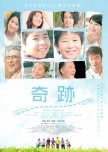
Koreeda understands children. Here, he portrays the children's "innocent" and wishful thinking in a manner that it should be. Koichi's wish of a family being together (to his final wish) shows a 12-year-old child's longing and eventual acceptance of the things he can and cannot change. Ryu's wish for something reflects his innocence to his final wish reflects his growth and understanding. This is the same for the other young supporting characters as well.
I Wish isn't dramatic, perhaps it would even come out not as strong as Koreeda's other films (it's tone is similar to that of Our Little Sister and both were received well in Cannes). But it didn't matter because the star of the film are the children and how they're making sense and living their own respective situations. It's gentle and it's so natural. Once again, Koreeda proves his consistency as a director with his trademarks: frame and music pacing, young talented cast, little details, family theme, the apparent contrasts, beautiful cinematography and symbolism.
Here, we have much more upbeat songs which reflects the film's overall tone. The two leads being brothers in real life is a very good decision as it helps a lot with the chemistry. That's also saying that the young cast is such a delight to watch. The little details in the sponge cake, swimming trunks, volcanic ash, CD, vegetable, horse-meat sashimi are recurring and symbolic throughout the film.
The central theme revolving around two bullet trains intersecting is also a really nice touch: it reflects the brothers and their life. Each living at the end of each other (one in Kagoshima, known from being next to a volcano and the other in Fukuoka while not "countrysides", it's less suffocating that Tokyo; hence, really beautiful setting) and each of them going in their separate ways. Hitching a plan to meet and see this "miracle" of two trains symbolizes them.
The apparent contrast between the two also compliment each other: the eldest is unhappy and grumpy, the younger one is energetic and happy. Living in Kagoshima is problematic while living in Fukuoka seems more carefree. The father is a happy-go-lucky while the mother is more serious. Koichi wears a uniform to school and lives with his grandparents while Ryu doesn't wear a uniform and lives his father and his band mates. These contrast work to show the opposite between the two yet what also ultimately ties them together: brotherhood.
Perhaps the fact that its 2 hour running time seem to feel a little draggy and long to watch. I had no problem with Our Little Sister's lack of direction/ultimate goal and just mere storytelling which is similar to I Wish but I think I Wish touches on little sub-plots that could have been avoided so as to not let it feel like it was too stretched out. But other than that, this is another one of Koreeda's great works.
Was this review helpful to you?
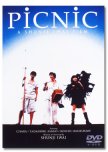
Iwai's portrayal of mental illness is not wishy-washy nor is it romanticized. Instead, he gives us something real. These characters speak with the desire to be understood. Often, their words carry more than one meaning -- one that many misunderstand. When Satoru says, "Save me" while being strangled by blankets left to dry, he meant 1) literally save me 2) save me from this world and from myself. These little details are so nice and appreciated.
Picnic is a simple tale. With just an hour running time, Iwai embraces the cinematography with such beautiful visuals and light soundtrack, it tugs at your heartstrings. Despite being confined to wall within the walls, you feel like you are also exploring the world with the three main characters. Their stories are disturbing but that's precisely what makes it feel real. Carrying a picnic basket while watching the end of the world is such a simple act, it makes the "end of the world" feel as if it's just an every day thing.
While the theme of religion play here, I don't think Iwai is preaching. Instead, he gives the message that our life is dictated by us as much as we believe in God or not.
The final scene, black feathers contrast with the pink/yellow sun as it's about to set is so beautiful I will remember it forever.
Was this review helpful to you?
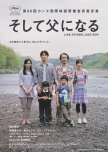
Like Father, Like Son is bittersweet tale that is jarred with the power and emotional bond of family. It takes into question: what makes a family? Is it blood or is it the bond? Is blood truly thicker than water? Swapped children is nothing new, it's a trope. But what Koreeda does is look into this issue in detail, explore it, strip its characters bare and allows the viewer to experience (and question) the responsibilities, the decisions and the identities made/done in the film.
It is a dramatic film but not one that drowns you in useless melodrama, not one that forces you to cry and not one that feeds you with cheesy lines as family. But instead, there is rawness, there is delicate emotions portrayed and more importantly, there is realness.
Again, Koreeda channels extraordinary young talents with the two boys -- Keita and Ryusei. Not only does the contrast between the two complement their differences but it also intensifies the differences of the two families. How will a carefree boy adapt to an independent, almost traditional life? How will an independent boy adapt to a non-traditional, carefree life? How will a work-oriented father bond with his energetic, non-traditional son? How will a fun-oriented father bond with his traditional, almost serious son?
These challenges show that the people who struggle in these circumstances are not adults alone, but also the children. Keita (his real life name) portrays Keita's cuteness with invisible strength and innocence. Shogen Hwang portrayed Ryusei's energy with utmost maturity and curiosity.
Masaharu Fukuyama portrays Ryota with a distant facade that eventually tears down while Jun Kunimura balances it out with her calm and honest personality. On the other side, Lily Franky portrayed the film's comic relief that wields undeniable wisdom of fatherhood to match Ryota's and is further complemented by Yoko Maki's gentleness and cheerfulness. Each and everyone of these actors portrayed their characters with unmatched performance.
It won Jury Prize in Cannes for a reason. And it has caught the eye of Spielberg for a reason.
Amazing cinematography with attention to details (e.g. Keita's hand made rose) that plays itself as something symbolic or important in the film. Not to mention the music pacing with the frames, such beautiful piano to listen to. And finally, the contrast of the close up from the adults' POV to the children and the long shots of the children's POV to the adults. These decisions, as a whole, make Koreeda truly a talented film maker.
Was this review helpful to you?

It's subtle but as with Koreeda, it's nothing new: it's about the little details and the little things. I say that Our Little Sister doesn't come as strong because it's less sentimental and it's less melodramatic. The conflict here is not as jarring as say, Nobody Knows or Like Father Like Son. That's one aspect that makes it seem directionless but if you look at it from another way, maybe that's the intention: not to have such a big conflict (the fact that the sister is another woman's is the central conflict) but to just tell a story. And one that's still touching. As someone who doesn't have a sister (I have two brothers and the middle child), I felt the bonds of sisterhood even just a little.
Koreeda trademarks are still present: music pacing (this time, not much piano), long shots showing the beauty of the setting hence, not much close-up and the little details (e.g. the umerashi). Though this time, we don't have young actors (save for Hirose Suzu who is around 17 years old when she filmed this), but the cast including Haruna Ayase, Kaho, Masami Nagasawa (who was also in I Wish) still delivers incredible performances. All three of them were nominated in Japan Academy Award for their performances.
I actually liked the contrast between the four sisters, Ayase plays the eldest, the mother figure, Nagasawa plays the carefree, stylish one, Kaho plays the oddball, happy-go-lucky and Suzu plays the quiet, simple one. It's such a treat to watch all these different personalities go together and interact. There is undeniable chemistry between the four.
Suzu (who won Breakthrough Star in Japan Academy Award), a current rising young star, whose two TV dramas I've seen, can act but sincerity lacks (like her eyes, it's shallow, it doesn't speak the emotions, you get what I mean? Some call her a deadeye actor but she can cry alright) although here because it's less melodramatic, her character fits her well, comparatively speaking. (But with more roles being given to her currently and working with talented actors, perhaps it's bound to change.)
As with Koreeda, lines are so natural and everything flows so well. The cinematography is so beautiful and the beauty of the countryside has been highlighted in the film. It also competed for Palme d'Or at Cannes 2015 (Suzu at Cannes at 17!!)
Our Little Sister isn't bad, I enjoyed it for its simplicity and beautiful visuals. But perhaps its unsentimental approach makes it a lackluster watch compared to other heavy Koreeda's dramas. Indeed, it doesn't have the feels but it has a calming effect as you watch: the setting helps, and the natural acting helps. It won't break your heart but it will touch your heart.
Was this review helpful to you?
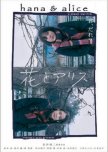
Watching this (as many other reviewers noted) was like reading a love letter. You see the story of two best friends, liking the same guy. That probably sounds shallow but it's something that happens in real life especially as you grow up and experience the wonders of a first love. And that's precisely why I love Hana and Alice. It's simplicity as a story calms you. It's nothing more than a simple tale that doesn't try to be too much than that it originally intended.
Iwai just delivers everything with such beauty. The colors aren't exotic nor are they bright but in a way, there's so mellow (but not in that dark way) and so refreshing to the eyes that you also fall in love with what you see on screen. These colors makes you feel closer to the characters and their story. Each scene, each setting is filled with visual beauty, I cannot praise it enough. Add some amazing soundtrack, the feels are everywhere. Especially for me, who has just entered her twenties.
The balance between Hana and Alice's life is also a nice touch, the other doesn't outshine the other. After all, this is about them. The similarities (absence of a male figure in their life, ballet) but also the contrast (Alice's house is filled with messy things while Hana's house is filled with flowers) shows the attention to details, the delicate choice that Iwai made. Also, Anne Suzuki and Yu Aoi just have such amazing chemistry together.
Yu Aoi's ballet dance sequence is so mesmerizing, I can watch her all day long. Anne Suzuki's heartbreaking confession is so pure, so heartfelt so evident of growing up, it brings back loads of memories.
Shinji Iwai is a great director that really does deserve more praise. He cares about setting as much as he cares about story as much as he cares about character. There's a fine balance of that here. (Always love his works with Yu Aoi too!)
Was this review helpful to you?
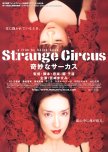
With themes dealing with incest, molestation, rape, depersonalization, mutation and transexuality, Sono takes you to a dark and disturbing journey. An unforgettable one. I've always seen Sono's works as ambiguous, weird and bizarre. Strange Circus might have just brought that to another level, rivaling even that of Takeshi Miike's standards.
This film deals a lot with the deconstruction of collectivism which really is a trait of Japanese society compared to the more individualistic trait of western society. You destroy one, you destroy the other. You create one, you take the other. The use of a traditional family (father, mother and child) is an example of that. Their home, one that looks more Western also shows that.
And Sono deconstructs family here, ultimately, to find individual identity for the characters. It's not an entertaining film. It's poetic in the most disturbing and weird way. There's a lot of metaphors, a lot of dark and bloody visuals. The white walls symbolizing innocence and purity is tainted with the horrors that unfold. And that last scene. So much symbolism. Anyone would think it's weird. But it actually meant a lot (and a satisfying close too) to the film's overall story.
Ultimately, the very ambiguous ending and non-linear storytelling tests the audience. Presenting you a disturbing way to tell a story, it asks if you indeed, as a viewer, were paying attention. Can you tell what's real or not? Sono takes you in, tries to make you think you understand it, only to stab you in the back with a plot twist that makes you question your own judgement. That part reminded me so much of Satoshi Kon's Perfect Blue. That psychological mindfuck.
Perhaps, the only problem that I have is the ambiguity of the story seems like it's going no where. The story itself doesn't have a goal, at least it wasn't established until the last 40-30 minutes of the film. You, the audience have a goal which is to figure out what the heck is happening. And if you don't know what's happening because of the huge ambiguity, that's a problem too.
Was I disturbed? You bet I was. But it's not because of the blood and gore. I was much more disturbed watching Miike's Audition. But the themes here are ones that will put a lot of people off. The rather surprising (and at the same time) cliche plot twist as well. It's a film that's a lot to take in, it's not enjoyable. But the masterful storytelling is one to applaud this film for.
Was this review helpful to you?
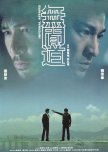
Leung and Lau are great contrasts to each other but at the same time, also compliments each other. With Lau's charismatic face, he delivers his character with such decency all the while keeping a dark secret. Leung on the other hand, has always been a playful character (he has played a policeman in Chungking Express too!) and his presence on screen is just really nice to watch.
Some say that Martin Scorsese's The Departed is a more "soulless" adaptation of Infernal Affairs but I can't say since I haven't seen the former. But the fact that it is a remake of the latter is enough of a statement to say it's good. I just hope those who watched the former know that it's based of on the latter (I mean with a cast like Dicarpio and Damon, it's difficult not to forget).
Infernal Affairs is intense, gritting and an exciting film to watch. The fact that you have a mole in the mafia and the mole in the police and it's a race against time to figure out the two is already enough to make something worth watching. Living in Hong Kong (and sometimes even taking it for granted), the cinematography of the city here is amazing. There is as much vibrancy as there is much darkness that embodies the two main characters as well.
The action isn't your-head-over-heels action compared to Western films but there's still that edge-of-your-seat feeling. So much dramatic tension and suspense especially on which mole will be figured out first.
Absolutely love that build-up before Eric Tsang (whom I know more as a comedian to be honest so his role here is a refresher for me too and he delivered it well) smashed Tony Leung's cast on the table -- I was surprised. It was too good of a scene. Add that up with music that gives you such adrenaline, you won't be able to take your eye off the screen. And that build-up up the way to the finale -- just brilliantly done. So many scenes that just gives you mini heart attacks.
I couldn't ask for a better ending as well.
I always saw Hong Kong crime thrillers as cheap and ambitious but that's a blind opinion since I haven't seen one before (except for some Jackie Chan classics which I'm not even sure counts as crime thriller) and then came Infernal Affairs. I take it back, Hong Kong crime thrillers are great.
Was this review helpful to you?

So there you have it. Tokyo Tribe. Tribes. Crazy stuff. Music. Fighting. And chaos. Lots of it. But it's Sion Sono. As I said to my brother, Sono always manages to add insanity in his films and still manage to make it work. If you watch a Sono films, you're transported to his world, his rules, his creation, his everything. With a crazy yet satisfying 4-hour journey from Love Exposure to blood fountains that swept me off my feet in Why Don't You Play in Hell, Tokyo Tribe might have just taken Sono's style to the next level. Bursting energy and life and music and characters from start to finish, you'll be the one feeling exhausted (yet also satisfied) as the credits roll. In Sono's world, you got to keep up. You're also there in the film alright.
Tokyo Tribe is messy, chaotic, loads more to improve it but like others, it doesn't matter. It's not about following traditional storytelling or traditional film-making, it's about presenting something with creative freedom as much as you like. Sono embodies that, Tokyo Tribe embodies that. Mix that here, put that there, add more here, even if things don't make sense, whatever! It's entertainment, it's about having fun. It's filled with pleasure and enough to keep you at the edge of yourself -- if you're used to Sono's style.
It's a big big cast alright but having such a truckload of people in a film makes it all the more enjoyable, it makes it all the more fun. It's not character-focused, you're not suppose to give a shit about anyone, you're just suppose to sit there and watch and laugh and enjoy. That's what you're suppose to do. These actors aren't that great singers (although one of the leads, Kai is from a J-pop band, he's not an actor but who cares because it doesn't matter) but that too doesn't matter. This isn't about music. It's about having fun! Sono just adds music because it doesn't feel like it belongs there (so Sono like!) but that's what makes it stand out. He always manages to put the bizarre and weird and make it look good.
(To be honest, watching Sometani laugh made me crack up a lot. Still manages to keep his signature look that I love even as a rapper. He's definitely a chameleon, whatever role he takes and clearly Sono loves him -- with good reasons.)
As always though, my take on Sono films is that they tend to be misogynistic. Loads of (unnecessary) boob shots, underwear shots and all that (I mean Love Exposure is all about that!) but I feel like he tries to compensate for that by giving us badass/I-can-save-myself female characters. And here, we have female characters that can fight. So thank goodness.
There is so much colors, so much sound and just so much everything, you don't have time to think, no time to react as each scene continues to drive you crazy. Sono proves his mastery at creating films that are filled with whatever the heck he can think of and want at his will and still make them something worth watching -- a genius.
Was this review helpful to you?

4 hours didn't feel like 4 hours at all. In fact, it made my 11 hours flight seem...so short. To summarize what Love Exposure is is difficult. But that's very Sion Sono-like anyway. He's an auter that way. I enjoyed Love Exposure because it was different, because it was refreshing. It's a combination of all these things that normally don't fit well together but Sono does just that -- very Sono-like again. You have religion in one area and then sexuality on the other. You have panty shots on one hand and blood on the other. You have sinning in one hand and confession on the other. They're not things that go hand in hand yet Sono makes a perfect combination out of them.
I don't know what Love Exposure wanted me to get out of it. But it doesn't matter. In fact, I think Sono doesn't even want to make you think too hard. You're not suppose to undergo some epiphany just because of it. It's just a mash-up of different things that keeps you entertained and also think but not to the point of overanalyzing -- much like Sono's other works anyway. Sono doesn't try to hard to insert things, he shows it to you.
The divisions of 4 chapters was cleverly done and balanced well enough. There are loads of characters but each of them are given their own screen time that it doesn't seem so lopsided. It's 4 hours alright, but I felt like everything mattered and needed to be there...no matter how bizarre and weird they seem.
Truly, it's a romantic comedy that isn't subtly one. Above all, I think it aims to reflect the whole parent vs. child conflict of how parents carve their children into their own ideals, ultimately abandoning who they truly are in the process. It's about bad parents raising "bad" kids. But mostly, it's about how love, above all, conquers. At the end of the day, you lose your memories, you fell out of the line...but love it could save you.
Great soundtrack, exciting, funny, amazing cast and acting and most of all entertaining without trying too hard. 4 hours? It'll pass by so fast you won't even notice it.
Was this review helpful to you?
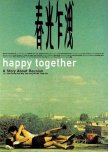
As with other Kar-wai films, it's always the cinematography that lunges at you. Typical of his style. I'd say that Happy Together is probably much more daring than his other films. Often overshadowed by In the Mood for Love and Chungking Express, Happy Together is both a happy and sad portrayal of romance. Yes, it's a love between two men. But instead of focusing on that aspect like other films do, it focuses more on their time together. It's cynical as much as it is positive. Kar-wai won Best Director at Cannes for a reason.
The film also pays tribute to classic noir style. But with a purpose. The black-and-white colors reflect their time apart. And gradually...color emerges. There's color when they rekindle their relationship or as they say "start over" again. The visuals speak as much as the story, as much as the actors. The aesthetics are also reminiscent of other Kar-wai elements -- cramped apartments, sudden close-ups, intense DOFs. But the colors are all retro. They're vibrant and intense. Add some exotic music to that. The setting and scenery are all beautiful. It's so so so appealing to the eyes.
Of course, we have Tony Leung Chiu-wai again. Yes, he won Best Actor for In the Mood for Love but I'd say Happy Together is his opus. It's a much more dramatic, challenging and intense character, he delivered in with more passion characters. He wants Po-wing (Leslie Cheung) but he can't show that but we still know he does -- that part is delivered very well. On the other hand, we have a charismatic Leslie Cheung here. He's able to deliver Po-wing's character with such rawness and explosion of emotions. Conflicted but at the same time very powerful. The chemistry between the two is undeniable.
The film is about intimacy. And it shows that. Chiu-wai and Cheung's acting all delivers that. In the cinematography, in the sounds, it shows all that. Even if Chiu-wai's character speaks in Cantonese while Chen's character speaks in Mandarin, it doesn't create a distance because it shows the understanding between the two. Happy Together is so underrated compared to its counterparts but it's also one of the most beautiful.
Was this review helpful to you?
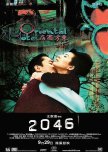
Having such a huge ensemble of well-known Asian actors from China, Hong Kong, Japan and even Taiwan (Tony, Zhang, Kimura) in itself makes 2046 a must-watch. It shows the powerhouse power of Asian cinema (even if it's mostly concentrated on East Asia but okay). 2046 is a daring film, much more daring than its more famous counterparts like Chung King Express and of course, In the Mood for Love.
Kar-wai, the auteur he is, combines 60s Hong Kong with sci-fi in such a non-linear narrative, much like his films, but it's really in 2046 that we see the intensity and effectiveness of that. The blend of the main story with the story of Chow's novel blend well, almost perfectly. Kar-wai here, transcends the realm of the present and the barriers of language.
His narratives are often called "weak" merely because they are simple and stretched out in a non-linear format and multiple arcs, but that's the Kar-wai way. It's unconventional. Combining 60s with sci-fi is an unlikely pair but he did. And does it so well that it's a big middle finger to mainstream film making/storytelling.
We have Cantonese, Japanese and Mandarin all played out and all three languages are dancing with the characters, another typical Kar-wai style. Cramped apartments that make inanimate object shots more beautiful, to cigarettes and smoking, to exotic music that makes you suffer from last song syndrome later (in different languages too!) to vibrant colors, everything is so beautiful to look at.
2046 is all about being stuck and choosing to move on. While there aren't as much setting shots as his other films, this one omits so with a purpose and to deliver the message he wants. Everyone on this film is stuck in the past, which makes them cling on to others. Like Kimura's, like Wong's and like Zhang's character, all of them are in search of moving on and especially Tony's. Kar-wai delivers his message in the most creative way possible.
Was this review helpful to you?
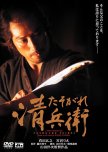
Two hours did not feel like two hours. It's slow-paced but it's not the kind that drags on into unnecessary details. It's also not the metaphorical tale that other try to be, the story is straightforward, simple yet there's also something so enthralling about it. You'd want to see Seibi's character and how he'd go about his life as a petty samurai with two young daughters and a senile mother to look after. He's portrayed in a pitiful way but not in the way that makes you feel sad for him but at the same time, makes you root for him. He's neither depicted as likable or unlikable, just the way he is. Raw and real.
I definitely loved the aesthetics of this film. It's set in mid-19th century Japan and everything about it feels like that -- even the Japanese that they use. I guess it's the dialect (?) but it does give off a very historical feel even the way the characters act down to the little details of the clothes, hair and such. But the colors aren't crisp that it evokes a nostalgic and dramatic feel that echoes the overall tone of the film. It's a tale of mundane life that's amplified but still concise.
Hiroki Koreeda cites his style as more of Yamada to which this having my first Yamada film, I can finally see now. The attention to details, the simplicity and the subtle dramatic tension makes the film all more beautiful. Seibei and Tomoe's formal courtship is filled with dramatic tension -- just perfect for its time. While the lone "action scene" is stretched to the last 30 minutes or so, Yamada tries to keep us at the edge of our seats as the two characters (hero and villain) talk things out before launching into battle mode, only to force us to take deep breathes as he suddenly lunges at us.
All in all, The Twilight Samurai is ultimately about family. And while a mundane tale, Seibei and the narrator (the daughter's) words make it a poetic, almost poignant one.
Was this review helpful to you?
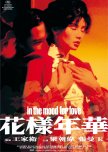
This film is about details. From small gestures, to quick looks, ringing of the telephone and shots of the clock to show the passing of time, it allows you to venture into a unrequited love story that's not painful but not overly dramatic. Kar-wai channels his use of details to move the story forward without too much effort just with simple rain, simple change of clothes or simple montage that exert such beauty it takes your breath away.
He knows how tell a story not through grand dialogues but through body language which is through cinematography. Not much head space here, much head space there, blurred wall here, never showing the face there, it leaves you guessing but also doesn't leave you in the dark. You know what's happening because it's being shown before it's being told. Repetition is also key here. Repetition blends well with time which blends well with setting and ultimately dances around the story.
If Chungking Express' aesthetic is filled with exotic colors, In the Mood for Love is vibrant and exhilarating with different colors even exhibiting some traces of noir style. Similar themes with Chungking, In the Mood for love portrays a more intimate type of longing, one that's filled with utmost desire that excites us through actions and not words spoken. We are plagued with a nostalgic 60s Hong Kong setting detail by detail and it entraps us into this alluring tale filled with cinematic beauty including slow motions and simple focus on blowing smoke; it is sexy without needing to be.
Maggie Cheung and Tony Leung exhibit such tension that we feel the love without needing to do anything passionate. Cheung's beauty transcends while Leung's restrained depiction is admired. There is delicateness present when they act together that just leaves you hungry for more. Of course this is all made possible by the soundtrack, handled by Shigeru Umebayashi. The music exerts feelings and flirts with Kar-wai's mastery of cinema together with the actors' vivid emotions makes everything a complete package.
Was this review helpful to you?

























